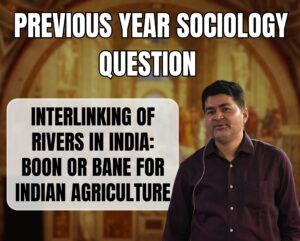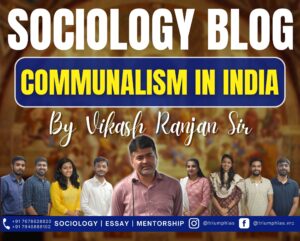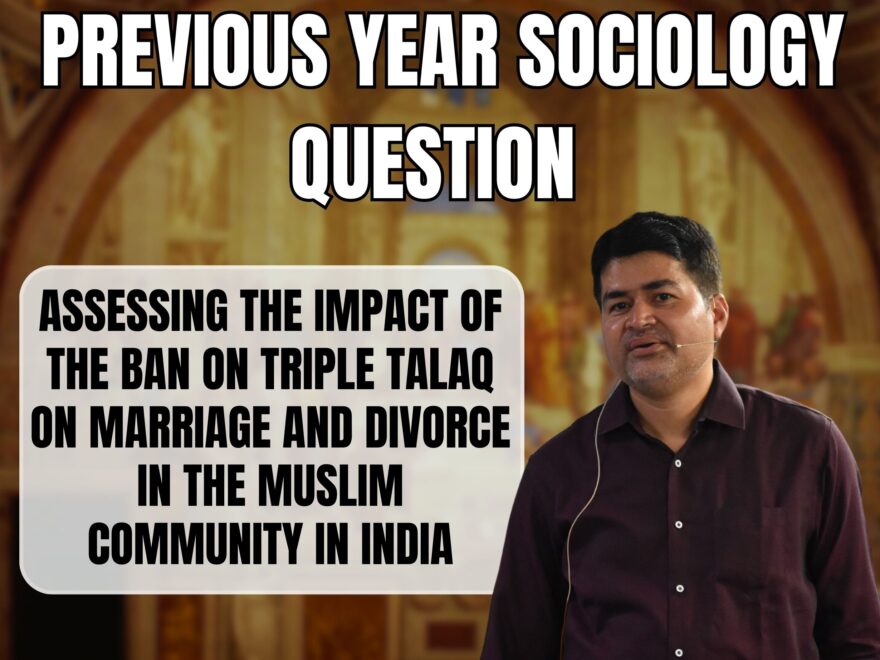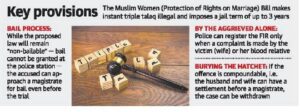Assess the impact of ban on triple talaq on marriage and divorce among the Muslims community in India.
Section: B
Sociology Paper 2018
(Relevant for Sociology Optional for Civil Services Examination)
Paper 2: Unit-12 Social Change in Modern Society; Systems of kinship in India
Question: Assess the impact of ban on Tripal Talaq on marriage and divorce among the Muslims community in India.
– 10 Marks
|
Introduction: What is ban on Triple Talaq Main Body: Positive Impact of The Muslim Women (Protection of Rights on Marriage) Act , 2019, Dysfunctional Analysis Conclusion: Addressing The Marginalization of The Muslim Community |
Introduction
- If a man belonging to the religion of Islam pronounces talaq thrice either orally or in written form to his wife. Then the divorce is considered immediate and irrevocable. The only way to reconcile the marriage is through the practice of nikah halala, which requires the woman to get remarried, consummate the second marriage, get divorced, observe the three-month iddat period and return to her husband.
- The Parliament has passed the Muslim Women (Protection of Rights on Marriage) Act , 2019, thereby criminalizing the practice of instant ban on Triple Talaq. The Supreme Court in Shayara Bano case (2017) had declared the practise of Tmple Talaq (talaq-e-biddat) a as unconstitutional.
Main Body:
Positive Impact of the Muslim Women (Protection of Rights on Marriage) Act , 2019
- Deterrence Effect: The ban has acted as a deterrent against arbitrary and instant divorce. Previously, some Muslim men would use ban on Triple Talaq as a means to end a marriage unilaterally and without consequences. The ban has discouraged such practices, leading to more careful consideration of marital issues.
- Legal Processes: The ban has shifted divorce proceedings from religious authorities to the legal system. Couples now have to go through the formal legal divorce process, involving court hearings and legal procedures. This has brought greater transparency and accountability to the divorce process.
- Empowerment of Women: Women’s rights activists argue that the ban has empowered Muslim women by giving them legal protection and the opportunity to negotiate divorce settlements. They can now seek alimony, custody of children, and fair division of marital assets.
- Reduction in ban on Triple Talaq Cases: There has been a noticeable decline in Triple Talaq cases since the ban was implemented. This suggests that the legal prohibition has effectively curbed this controversial practice.
- Increase in Mutual Consent Divorces: The ban has encouraged couples to opt for mutual consent divorces, as this is considered a more acceptable and legally sound method. This shift has resulted in fewer contentious divorce cases.
Dysfunctional analysis:
- While the ban is seen as a positive step, its effectiveness depends on enforcement. There have been reports of challenges in implementing the ban uniformly, and cases of clandestine ban on Triple Talaq still surface.
- Despite the ban, societal and religious factors continue to influence divorce within the Muslim community. Stigma around divorce and societal pressures can still be significant, impacting women’s decisions to seek divorce.
It is seen as interference in religious affairs. It is seen against secularism. It can further alienate the minorities in country.
Conclusion
Beyond legal measures, fostering awareness and gender-sensitive socialization, empowering women, and addressing the marginalization of the Muslim community, as emphasized by the Sachar Committee, are essential to combat ban on Triple Talaq and promote inclusivity and gender equality within society.
Related Blogs …
 |
 |

To master these intricacies and fare well in the Sociology Optional Syllabus, aspiring sociologists might benefit from guidance by the Best Sociology Optional Teacher and participation in the Best Sociology Optional Coaching. These avenues provide comprehensive assistance, ensuring a solid understanding of sociology’s diverse methodologies and techniques.
META TAGS:
Ban on triple talaq, Triple Talaq ban, Muslim Women (Protection of Rights on Marriage) Act 2019, marriage and divorce in Muslim community, legal prohibition, empowerment of women, gender equality, societal challenges, religious interference, minority rights, Sachar Committee recommendations, triple talaq,
Why Vikash Ranjan’s Classes for Sociology?
Proper guidance and assistance are required to learn the skill of interlinking current happenings with the conventional topics. VIKASH RANJAN SIR at TRIUMPH IAS guides students according to the Recent Trends of UPSC, making him the Best Sociology Teacher for Sociology Optional UPSC.
At Triumph IAS, the Best Sociology Optional Coaching platform, we not only provide the best study material and applied classes for Sociology for IAS but also conduct regular assignments and class tests to assess candidates’ writing skills and understanding of the subject.
Choose The Best Sociology Optional Teacher for IAS Preparation?
At the beginning of the journey for Civil Services Examination preparation, many students face a pivotal decision – selecting their optional subject. Questions such as “which optional subject is the best?” and “which optional subject is the most scoring?” frequently come to mind. Choosing the right optional subject, like choosing the best sociology optional teacher, is a subjective yet vital step that requires a thoughtful decision based on facts. A misstep in this crucial decision can indeed prove disastrous.
Ever since the exam pattern was revamped in 2013, the UPSC has eliminated the need for a second optional subject. Now, candidates have to choose only one optional subject for the UPSC Mains, which has two papers of 250 marks each. One of the compelling choices for many has been the sociology optional. However, it’s strongly advised to decide on your optional subject for mains well ahead of time to get sufficient time to complete the syllabus. After all, most students score similarly in General Studies Papers; it’s the score in the optional subject & essay that contributes significantly to the final selection.
“A sound strategy does not rely solely on the popular
Opinion of toppers or famous YouTubers cum teachers.”
It requires understanding one’s ability, interest, and the relevance of the subject, not just for the exam but also for life in general. Hence, when selecting the best sociology teacher, one must consider the usefulness of sociology optional coaching in General Studies, Essay, and Personality Test.
The choice of the optional subject should be based on objective criteria, such as the nature, scope, and size of the syllabus, uniformity and stability in the question pattern, relevance of the syllabic content in daily life in society, and the availability of study material and guidance. For example, choosing the best sociology optional coaching can ensure access to top-quality study materials and experienced teachers. Always remember, the approach of the UPSC optional subject differs from your academic studies of subjects. Therefore, before settling for sociology optional, you need to analyze the syllabus, previous years’ pattern, subject requirements (be it ideal, visionary, numerical, conceptual theoretical), and your comfort level with the subject.
This decision marks a critical point in your UPSC – CSE journey, potentially determining your success in a career in IAS/Civil Services. Therefore, it’s crucial to choose wisely, whether it’s the optional subject or the best sociology optional teacher. Always base your decision on accurate facts, and never let your emotional biases guide your choices. After all, the search for the best sociology optional coaching is about finding the perfect fit for your unique academic needs and aspirations.
Follow us:
🔎 https://www.instagram.com/triumphias
🔎https://www.youtube.com/c/TriumphIAS
🔎https://t.me/VikashRanjanSociology
Find More Blogs
| Compare and contrast Karl Marx’s and Max weber’s | Karl Marx- Historical Materialism |
| Talcott Parsons : Social system | Scope of the subject and comparison with other social sciences |




